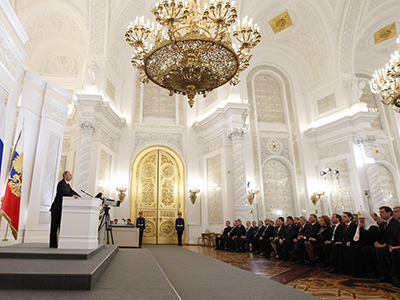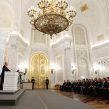
Putin Tries to Formulate Political Agenda for His New Six-Year Term
Publication: Eurasia Daily Monitor Volume: 9 Issue: 228
By:

Vladimir Putin delivered the annual presidential address to the joint session of parliament on December 12—his first after reelection to the Kremlin last March. The Kremlin was promoting the coming address as a highly important statement intended to put together a political and economic agenda for Putin’s third six-year term as president. The result was generally disappointing: a rambling 80-plus-minute speech full of endless figures intended to illustrate Putin’s successes since taking over Russia in 2000; while concrete plans for the future were left vague. According to a former Kremlin insider, Putin’s long-time adviser and spin-doctor Gleb Pavlovsky, this was the president’s worst national address since 2001 (Moskovsky Komsomolets, December 13). The president spoke about the need to diversify Russia’s oil, gas and metals export-dominated economy—a theme he has repeated since 2000 with little practical effect. Since 2008, Russia has been hemorrhaging capital at an alarming rate—with the overall outflow since 2008 being some $300 billion more than the inflow of capital. Even more embarrassing is the fact that the main perpetrators of this capital flight seem to be Putin’s own henchmen and the network of privileged state corporations he has created and handed over to friends and supporters (Vedomosti, December 12).
The massive and constant outflow of capital undermines the sluggish economy as well as attempts to modernize and diversify the industrial base and national infrastructure. Slow economic growth breeds social unrest and threatens the stability of Putin’s personalized regime, creating political uncertainty that in turn stimulates more capital outflow. Putin spent a large part of his address directly addressing his top ruling elite sitting opposite him in the great St. George’s Kremlin palace hall, calling on them to stop acting irresponsibly, to show some patriotism and return to Russia at least part of the billions they have stolen and placed offshore. Putin actually joked: “Stop applauding; you may not like what you will hear” (www.kremlin.ru, December 12).
Putin demanded that the economy be “de-offshored.” Shares of state-controlled corporations hidden in offshore shell companies for safekeeping and to minimize taxes must be brought back and listed on the Moscow stock exchange. Putin announced that government officials, including the deputies of both houses of parliament, must not hold bank accounts or stocks abroad and must declare all foreign real estate, providing information on the sources of wealth used to purchase it. The proposal to forbid officials and deputies from keeping money or investments and real estate abroad was proposed last summer by a group of Duma deputies. Putin has, in fact, watered the proposition down. He is de facto allowing the elite to keep its real estate and is talking about imposing “limitations” instead of a total ban—despite all the rhetoric demanding that the elite become “patriotic” and stop undermining their credibility with the masses by not only stealing the national wealth, but also stockpiling it abroad. According to Pavlovsky, Putin could not be “that much a sadist” to take away the French Riviera, Sardinia and Capri villas of his loyal elite “that they believe to be their staple necessity” (Kommersant, December 12).
Putin sees enemies abroad and within, not fully certain if his elites are indeed loyal. Putin talked about the entire world entering a period of instability and conflicts over competition to secure resources. This seems to be a reference to the theory popular with part of the Moscow expert community that the present world recession may lead to a world war—in the same way that the Great Depression of the 1930s led to World War Two. The popular narrative is that forces of global “evil,” led by the United States and its Western allies, will provoke a war to ensure world domination and to permanently enslave the forces for “good”—of Orthodox Christianity and Islam, led by Moscow and, say, Tehran. To be ready, Russia must swiftly rearm and try to form a broad anti-Western alliance, according to former general staff analyst, Captain First Rank Konstantin Syvkov (VPK, December 12).
Putin also preaches the buildup of military might and national patriotic consolidation as the base to maintain a “sovereign and independent Russia.” Putin promises to maintain democracy “based on Russian traditions—not on foreign standards.” (Of course, Russia traditionally was a brute secret police state, with democratic traditions nonexistent.) According to Putin, any politician or political movement that has foreign connections will be outlawed, “since they serve foreign powers.” Putin previously flirted with Russian nationalism, but in this week’s address insisted that all loyal citizens are “Russians,” no matter what ethnic background, declaring nationalism an enemy of Russian state unity (www.krenlin.ru, December 12). This change is understandable: Over the past year, Russian nationalist groups were an active part of the anti-Putin protest movement together with liberals and leftists.
A pragmatic leader, Putin easily reverses seemingly important decisions if this helps achieve his main purpose—to stay in power indefinitely. From 1993 to 2003, Russian Duma deputies were elected: half through proportional political party representation and the other half in first-past-the-post constituent elections. In 2007 and 2011, elections were only proportional, but this week Putin suggested restoring the constituencies. Russian experts believe this reform is intended to help pro-Putin United Russia control the Duma, even if its popularity continues to fall—deputies representing a single constituency are easier to bribe to change political allegiances—the way Viktor Yanukovych continues to control parliament in Ukraine (Kommersant, December 13).
The Putin regime seems to be ready to continue a political crackdown to eliminate the pro-democracy protest movement that began a year ago in Moscow. A Freedom March (Marsh Svobody) was planned by the opposition on December 15, but for the first time in a year the Moscow authorities have refused to allow marching anywhere near the Kremlin. Authorities have threatened mass arrests and criminal prosecution of the opposition. Leaders of the opposition have formally called off the march, but announced they will, as individual citizens on December 15 go to the Lubyanka Square opposite the headquarters of the former KGB (now FSB) to lay flowers at a memorial to victims of political repression in Russia (Interfax, December 13). A showdown seems inevitable. The future of Russia, for better or worse, will be determined in the streets of Moscow and not in the rubberstamp parliament that Putin addressed.




